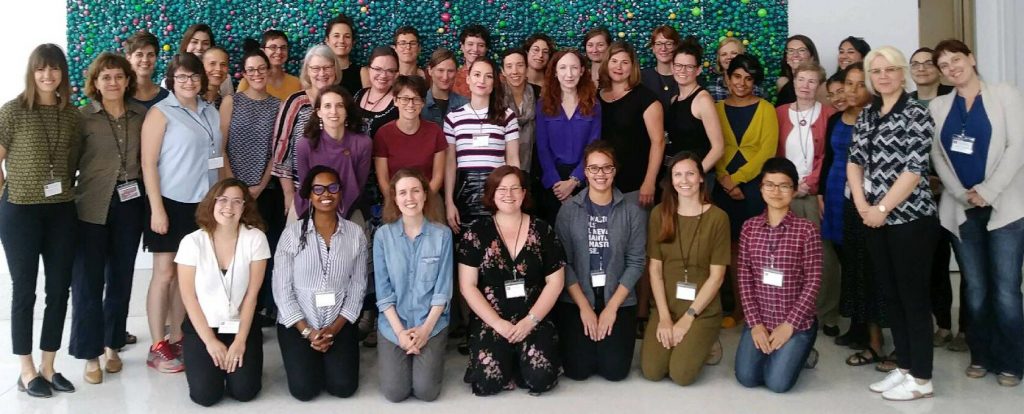Mentoring Workshop for Early Career Women in Philosophy
The Mentoring Project Workshop, an initiative of the Women in Philosophy Task Force, aims to provide women in the early stages of their careers in philosophy with feedback on their current work and longterm professional guidance.

Currently funded by the Marc Sanders Foundation, the next workshop in the biennial series will take place July 23-25, 2023 at the University of Missouri. Here’s a description of from the organizers:
Mentees will be assigned a networking group consisting of a mentor and four fellow mentees working in similar fields. Each mentor will provide written feedback on the workshop papers of each mentee and will participate in discussions at the workshop. Mentees will take responsibility for providing written feedback on the papers of their group members and will serve as discussion leader and first reader for one paper and second reader for another. In the long term, group members will actively monitor the progress of each other’s careers, offering philosophical feedback and, in the case of the mentors, advice about professional development along the way.
The directors of the workshop are Susanne Sreedhar (Boston University), Carol Hay (University of Massachusetts, Lowell), and Alice MacLachlan (York University).
Regarding who is eligible to attend, they say:
While we retain the historic title for this workshop, the directors would like to emphasize it is intended for and inclusive of all women-identified and non-binary early-career post-PhD philosophers… Any woman or non-binary person (including trans-masculine people) entering or holding a faculty position (pre-tenure or contract) in Philosophy at a college or university, or who is unaffiliated, within 10 years of completing their PhD, and continues to engage with professional philosophy. We would especially like to encourage applications from members of groups underrepresented in Philosophy.
For more details and instructions on applying, go here.
(via Carol Hay)
Related: Networking and Mentoring Workshop for Graduate Student Women in Philosophy, Philosophy Job-Market Mentoring Program



Three of the nine photos used to promote this year’s workshop include images of cement stairs. Amongst disabled communities internationally, stairs and staircases are regarded a symbol of inaccessibility, inequality, and systemic ableism (though certainly not the only such symbol). Hence, the inclusion of these photos on the workshop’s (inaccessible) website suggests that the organizing committee of this workshop needs to better inform itself about (the apparatus of) disability and ableism, what constitutes ableism and why, what barriers to relative achievement disabled students and faculty actually confront, how these are produced and manifest, and why.
Here is an online article that describes “The Capitol Crawl,” an important action taken by American disabled activists in 1990 in which they crawled up the stairs of Capitol Hill to protest systemic inaccessibility in the US and garner support for the Americans with Disabiliities Act (ADA): https://www.history.com/news/americans-with-disabilities-act-1990-capitol-crawl
I mentor many disabled philosophers, at all stages of their careers. I can assure everyone reading this comment that the philosophical community is not doing a good job, or even an adequate job, of guiding, advising, and supporting disabled philosophers.
If you wish to learn more about the ableism and the variety of forms of exclusion that your disabled students and colleagues confront and what needs to be done to begin to change this egregious state of affairs, I strongly recommend that you read the interviews that I conduct in the Dialogues on Disability series. The series is archived here: https://biopoliticalphilosophy.com/dialogues-on-disability/
I agree that more needs to be done to support disabled and differently-abled philosophers (amongst other under-represented groups in our profession). I have no affiliation with the workshop, but I was looking at their site and found this, thought it relevant to put here: Accessibility: The Mentoring Project is committed to making the Workshop completely accessible to disabled philosophers. All meeting, dining, and guest rooms are wheelchair accessible. Philosophers needing ASL interpreters or assistive technology are asked to communicate such needs on the form.
Perhaps the problem of inequality and exclusion to which I have tried to draw attention will become more recognizable if we consider the work that the photos are meant to do on the website and in particular what work the images of the stairs/staircases are meant to do, especially when considered as part of the entire photo display on the site.
These photos on the site, including the photos with stairs and staircases, are meant to convey a sense of inclusion and community, a sense of comradeship and togetherness. I have drawn attention to what these photos of stairs and staircases symbolize to many disabled people and to disabled communities worldwide:stairs and staircases symbolically represent infrastructural exclusion and injustice, a form of institutional violence. In short, the images of stairs/staircases are a mechanism of ableism, (inadvertently) sending a particular message to a particular constituency, a constituency from which the organizers of this project should actually strive to learn and to which they should present themselves with some degree of deference.
Last summer, one of my favourite disabled twitter friends posted an eloquent thread that took as its starting point the claim that one of the most painful aspects of being a disabled person is that no one ever apologizes for their ableism. The thread was enormously popular amongst disabled academics and activists because it is so true.
One might understand apologia in more systemic, political, and institutional terms as accountability. In other words, it is integral to academic ableism that nondisabled academics are generally not accountable to disabled academics for the structural oppression, discrimination, and exclusion that disabled people confront. Have the organizers of this workshop been accountable? Why hasn’t Carol Hay (or Alice or Susan), who submitted this post, addressed my “complaint” (in Sara Ahmed’s sense of the word)? Or should my “complaint” (again, in Ahmed’s sense) be disregarded now that the “likes” for Madeleine’s comment have begun to materialize?
Finally, I feel compelled to point out that the term ‘differently-abled’ is widely regarded by disabled people as a euphemism that naturalizes disability and obscures its contingent, political, and socially constituted character.
My apologies for using ‘differently-abled’.